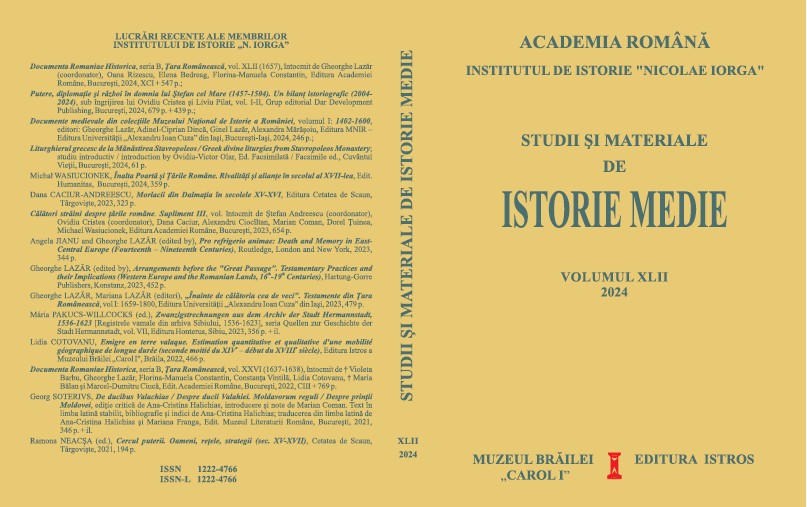Comerțul venețian în nord-vestul Mării Negre la începutul secolului al XVII-lea: implicațiile unui document
Venetian Trade in the Northwest Black Sea in the Early Seventeenth Century: a Document and its Significances
Author(s): Cristian Nicolae ApetreiSubject(s): History, Economic history, Social history, Middle Ages, Modern Age, 16th Century, 17th Century
Published by: Institutul de Istorie Nicolae Iorga
Keywords: Venetian trade; wine trade; Cretan merchants; Vevelli family; Poland; Black Sea; Moldavia; Ottoman Empire; 17th Century;
Summary/Abstract: On 16 June 1610, the Venetian ambassador (bailo) to Constantinople Simone Contarini appointed Antonio Massari, a merchant from Dalmatia, as consul in the Polish city of Lviv. His mission was to protect the interests of Venetian merchants coming to Poland via the Black Sea and Moldavia. This paper identifies three research topics that benefit from data provided by the appointment document and assesses how it changes the perspectives we have on these topics. First, the document provides new information about the Vevelli merchants, one of the Cretan families successfully involved in the Venetian malmsey trade. The information allows for the identification of one of the family’s unknown members, as well as the chronology of the Vevellis’ trading operations in the Polish kingdom. Second, the presence of the Venetian consul in Lviv changes the way we perceive the final phase of the Venetian wine trade in Poland: its decline came later than previously considered; consequently, its causal explanations need to be revised. Third, Antonio Massari’s appointment is also relevant to the context of trade relations between Venice and the Ottoman Empire. It suggests that the Polish city of Lviv, along with the Ottoman ports of Chilia and Caffa, was part of the Venetian consular network established in the first half of the 17th century both on the northwestern coast of the Black Sea and in its hinterland. Finally, the latter conclusion suggests that the closing of the Black Sea by the Ottomans in the 16th-17th centuries was not complete. The navigation of Western trading ships was conditioned and restricted by the authorities in Constantinople, but it was not totally forbidden.
Journal: Studii şi Materiale de Istorie Medie (SMIM)
- Issue Year: XLII/2024
- Issue No: XLII
- Page Range: 193-206
- Page Count: 14
- Language: Romanian
- Content File-PDF

